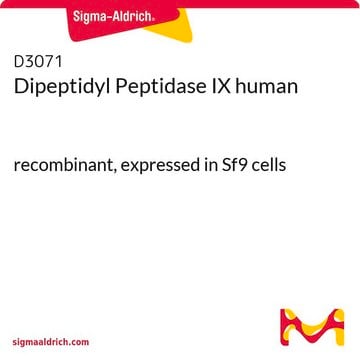D3571
Dipeptidyl Peptidase III human
recombinant, expressed in Sf9 cells
Szinonimák:
DPP III
Bejelentkezésa Szervezeti és Szerződéses árazás megtekintéséhez
Összes fotó(1)
About This Item
UNSPSC kód:
12352204
NACRES:
NA.54
Javasolt termékek
rekombináns
expressed in Sf9 cells
Minőségi szint
form
solution
specifikus aktivitás
≥400 units/μg protein
molekulatömeg
82 kDa
koncentráció
≥0.1 mg/mL
kiszállítva
dry ice
tárolási hőmérséklet
−70°C
Géninformáció
human ... DPP3(10072)
Related Categories
Alkalmazás
Human dipeptidyl peptidase III has been used in a study to assess the effect of entropy-driven binding of opioid peptides on large domain motion in human dipeptidyl peptidase III. Human dipeptidyl peptidase III has also been used in a study to investigate Ets-1/Elk-1 as a critical mediator of its transcription in human glioblastoma cells.
Biokémiai/fiziológiai hatások
DPP III is a cytosolic zinc-exopeptidase that is involved in the intracellular protein catabolism of eukaryotes. The enzyme is a monomeric acidic protein with a molecular mass of approximately 82,000 Da and a pI of 4.5-4.6. It is sensitive to freezing and temperatures above 40 °C. It is found to be inhibited by metallo-chelators and sulfydryl reagents. The activity can be restored by divalent cations and thiol compounds. It has a particularly high affinity for angiotensin III. It acts as a post-proline-cleaving enzyme on endomorphins.
Egység definíció
One unit will hydrolyze 1.0 picomole of Arg-Arg-AMC per minute at pH 7.5 at 25 deg °C
Fizikai forma
Supplied as a solution in 45 mM Tris-HCl, pH 8.0, 124 mM NaCl, 2.4 mM KCl, 18 mM glutathione, 10% glycerol and 3 mM DTT.
Tárolási osztály kódja
12 - Non Combustible Liquids
WGK
WGK 1
Lobbanási pont (F)
Not applicable
Lobbanási pont (C)
Not applicable
Analitikai tanúsítványok (COA)
Analitikai tanúsítványok (COA) keresése a termék sarzs-/tételszámának megadásával. A sarzs- és tételszámok a termék címkéjén találhatók, a „Lot” vagy „Batch” szavak után.
Már rendelkezik ezzel a termékkel?
Az Ön által nemrégiben megvásárolt termékekre vonatkozó dokumentumokat a Dokumentumtárban találja.
Antonija Tomić et al.
Journal of molecular recognition : JMR, 24(5), 804-814 (2011-08-04)
Human dipeptidyl peptidase III (DPP III) is a zinc-exopeptidase with implied roles in protein catabolism, pain modulation, and defense against oxidative stress. To understand the mode of ligand binding into its active site, we performed molecular modeling, site-directed mutagenesis, and
Simon Stenberg et al.
eLife, 11 (2022-07-09)
Deletion of mitochondrial DNA in eukaryotes is currently attributed to rare accidental events associated with mitochondrial replication or repair of double-strand breaks. We report the discovery that yeast cells arrest harmful intramitochondrial superoxide production by shutting down respiration through genetically
M Abramić et al.
Biological chemistry Hoppe-Seyler, 369(1), 29-38 (1988-01-01)
Purification procedure for dipeptidyl peptidase III (DPP III) from human erythrocytes cytosol, entailing separations on DEAE-cellulose, hydroxylapatite and Sephacryl S-200 column, which gave homogeneous preparation in 35% yield, is described. The enzyme was shown to be a monomeric acidic protein
Gustavo A Bezerra et al.
Proceedings of the National Academy of Sciences of the United States of America, 109(17), 6525-6530 (2012-04-12)
Opioid peptides are involved in various essential physiological processes, most notably nociception. Dipeptidyl peptidase III (DPP III) is one of the most important enkephalin-degrading enzymes associated with the mammalian pain modulatory system. Here we describe the X-ray structures of human
Marina Barsun et al.
Biological chemistry, 388(3), 343-348 (2007-03-07)
Dipeptidyl peptidase III (DPP III) is a zinc exopeptidase with an implied role in the mammalian pain-modulatory system owing to its high affinity for enkephalins and localisation in the superficial laminae of the spinal cord dorsal horn. Our study revealed
Tudóscsoportunk valamennyi kutatási területen rendelkezik tapasztalattal, beleértve az élettudományt, az anyagtudományt, a kémiai szintézist, a kromatográfiát, az analitikát és még sok más területet.
Lépjen kapcsolatba a szaktanácsadással







